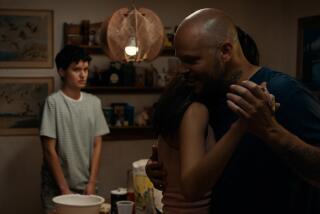BOOK REVIEW : Home’s Foundation Is Built on Pathos : IN THE SPANISH BALLROOM <i> by Doris Rochlin</i> ; Doubleday; $18.95, 258 pages
- Share via
Two weeks with Juanita might be just barely endurable if you could keep glancing at your return ticket and checking the days off on a calendar, but Linda Jo Merceau isn’t that lucky.
She’s back in her widowed mother’s house with her timid 6-year-old son, Paulie, and her agoraphobic brother, Franklin, in the acutely miserable position of the not-quite-divorced woman who’s still unwilling to admit that her marriage was a mistake. Linda Jo’s playboy husband, Buddy, has abandoned her to find himself in California, leaving a note on the fridge and a stack of unpaid bills.
This visit “home” is the result of sheer financial desperation, and there’s no end in sight. Juanita isn’t making the situation any easier with her pessimistic remarks and the “serpent gaze” that Linda Jo’s father said could sear your skin or curdle cream from 20 paces. Time hasn’t improved Juanita’s disposition one iota, and she lets no opportunity pass to remind Linda Jo of her shortcomings.
Though she’s not entirely resigned to the idea of divorce, Linda Jo has allowed herself to be diverted by Reece, a shallow young man who has just tasted the joys of freedom after years of caring for his invalid mother, and is in no hurry to relinquish bachelorhood for the responsibility of a ready-made family. You can neither blame him nor admire him.
Hovering in the wings is Monte, the slow-witted but fundamentally noble suitor who lost out when Linda Jo eloped with Buddy. Monte hopes he might have a second chance if Linda Jo’s situation deteriorates still further; when Juanita is felled by a heart attack, Monte has the opportunity to show how caring, generous, kind, solid and dull he can be.
Meeting these unsatisfactory contenders for Linda Jo’s favors, listening to Juanita’s dire warnings on the perils lurking behind every innocent pleasure, visiting Franklin in the dark and stuffy room he refuses to leave, we can only marvel at Linda Jo’s resilience and spirit.
Once a brilliant student, witty, handsome and athletic, Franklin has been felled by a sense of cosmic misery. After a half-hearted attempt at therapy failed, he has not only accepted his despair but begun to wallow in it, defeating his sister’s determined efforts to rouse him from his apathy.
Juanita simply refuses to acknowledge that his illness is anything more than a “phase,” and persists in the belief that he’ll snap out of it, as though agoraphobia were a bad habit to be overcome by willpower.
Franklin’s withdrawal apparently began four years earlier, shortly after the death of their father, a sweet, brow-beaten man lovingly remembered by his children.
The Spanish Ballroom of the title alludes to the dance pavilion in an amusement park where he would take the children for a respite from the grim atmosphere at home. Now the Spanish Ballroom is a decaying wreck, as dysfunctional as the family that once cavorted there; an obvious but effective symbol for these disordered lives.
Rochlin manages to infuse this bleak theme with her heroine’s life-saving vitality. Even Franklin, endlessly sketching the sparrows outside his window, refusing to dress in anything but his father’s old brown bathrobe, rejecting all offers of help, is permitted flashes of his old humor.
Where a lesser writer might have allowed him to become grotesque or bathetic, Rochlin succeeds in making his paralyzing anguish comprehensible.
Juanita’s heart attack becomes the catalyst for changes--forcing Franklin to deal with his psychosis, ending Linda Jo’s passive drift back to her unsatisfactory marriage, showing Reece, Monte and the returned Buddy in their true colors. Confronted by her own mortality, Juanita mellows.
By the end of the book, we can not only imagine surviving Juanita’s company, but actually enjoying a few days at the begining and the end of the visit.
Next: Carolyn See reviews “The Man From Raffles” by William Overgard (Simon & Shuster).
More to Read
Sign up for our Book Club newsletter
Get the latest news, events and more from the Los Angeles Times Book Club, and help us get L.A. reading and talking.
You may occasionally receive promotional content from the Los Angeles Times.










